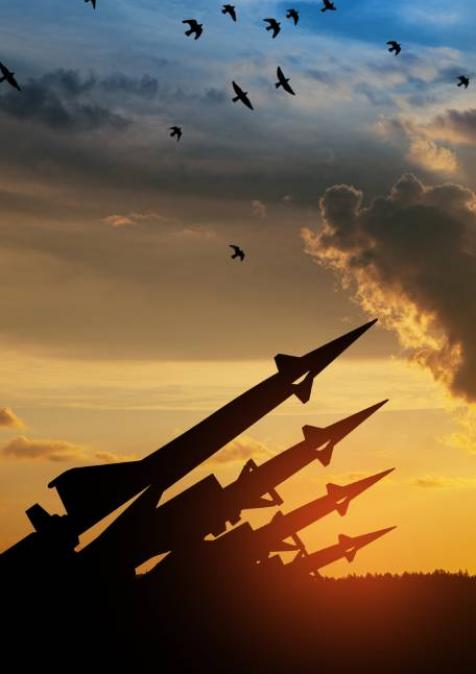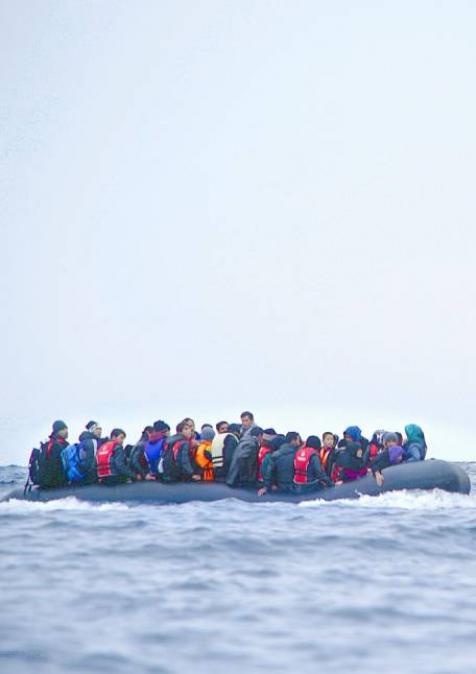Publications /
Opinion
They did not know who the fighters were; the Turkic-language speaking citizens did not understand a word they said. Sure, they were the enemy, because they were killing their brothers and sisters and destroying their homes in Nagorno-Karabakh, a forgotten enclave loyal to Armenia but surrounded by Azerbaijan. In September 2020, when the fighting erupted again, it did not take long to find out who had sent these foreigners to kill or expel them from their land, named by its inhabitants as the Republic of Artsakh after the last civil war at the end of the 1980s. A United Nations working group on the use of mercenaries found “widespread reports that the government of Azerbaijan, with Turkey’s assistance, relied on Syrian fighters to shore up and sustain its military operation” (Human Rights Commission, October 2020).
“The fighters appeared to be motivated primarily byprivate gain, given the dire situation in the Syrian Arab Republic,” according to the UN. “In case of death their relatives were reportedly promised financial compensation and Turkish nationality”. In other words: Ankara intervened to help its Muslim allies. And, by the end, 541 out of 2588 Syrian mercenaries had died, because that’s what they were, soldiers of fortune, paid cannon fodder for kings, emperors and dictators. The UN confirmed: “Reports indicate that Turkey engaged in large-scale recruitment and transfer of Syrian men to Azerbaijan through armed factions, some of which are affiliated with the Syrian National Army”. According to Chris Kwaja, who chaired the UN working group: “The alleged role of Turkey is all the more concerning given the similar allegations addressed earlier ... in relation to its role in recruiting, deploying and financing such fighters to take part in the conflict in Libya”.
On November 9, 2020, a ceasefire was signed in the Caucasus, and Azerbaijan regained control over five cities, four towns, 286 villages and the Azerbaijan-Iran border. The Republic of Artsakh lost its identity and the Syrian mercenaries faded away, possibly deployed elsewhere. For UN experts these Syrians are “allegedly affiliated with armed groups and individuals that, in some cases, have been accused of war crimes and serious human rights abuses during the conflict in Syria, thus seemingly perpetuating a cycle of impunity and risking further abuses of international law”.
The truth is that mercenaries and private armies, including the infamous Moscow-financed Wagner Group, are in vogue again. Some months ago the U.S. African Command reported that at least 14 MIG 29s and SU24s had been flown from Russia to Syria, where their Russian markings were painted over, and then the aircraft were flown to Libya, a violation of the UN arms embargo. In April 2021, a rebel group, allegedly trained by Russian mercenaries in Libya, tried to invade Chad, and killed the nation’s President Idriss Déby, who had moved to the front lines to organize the defense against the intruders. The Wagner Group, reported the American think tank, the RAND Corporation, has sent hundreds of trainers and security personnel to the Central African Republic to help Russian commercial interests secure mining rights, and to support a complex regional diplomatic push to increase Russian influence. “Mercenaries are more powerful than experts realize, a grave oversight. Those who assume they are cheap imitations of national armed forces invite disaster, because for-profit warriors are a wholly different genus and species of fighter”, wrote Sean McFate in Mercenaries and war: Understanding Private Armies Today (Dec. 4, 2019, National Defense University Press). “Patriotism is unimportant, and sometimes a liability. Unsurprisingly mercenaries do not fight conventionally, and traditional war strategiesused against them may backfire”. The newly re-discovered “Outsourcing of Violence” (IPG Journal, August 20,2020) is “one of the most dangerous trends of our time” confirmed McFate in his study, yet it is invisible to most observers. “The implications of a resurrected market for force in world affairs are substantial. Offering the means of war to anyone who can afford it will transform warfare and the future of war. If money can buy firepower, then large corporations and the super-rich will become a new kind of superpower”.
‘Growing at an Alarming Rate’
McFate is Professor of Strategy at the College of International Security Affairs at the National Defense University, and a former paratrooper in the U.S. Army’s 82nd Airborne Division. He used his military experience as a military contractor in Africa, where he dealt with “warlords, raised small armies, worked with armed groups in the Sahara, transacted arms deals in Eastern Europe” and “honed Burundi’s elite Presidential guard, and helped build Liberia’s military’ from scratch. The former paratrooper has no doubt: Private force has become big business, and global in scope. No one truly knows how many billions of dollars slosh around this illicit market. All we know that business is booming”. Nigeria secretly turned to mercenaries to battle the Islamic terrorist group Boko Haram. The United Arab Emirates dispatched hundreds of special-forces mercenaries to fight the Iranian backed Houthis in Yemen. “Hailing from Latin American countries like Colombia, Panama, EL Salvador and Chile”, wrote McFate, “they were all tough veterans in the drug wars, bringing new tactics and toughness to Middle East conflicts. They were a bargain too, costing a fraction of what an American or British mercenary would charge, so the Emirates hired 1800 of them; paying two to four times their old salaries”. Thus mercenaries and private military companies are “the guided weapons of the autocrats and other warlords”, noted the IPG Journal, “they can be used anywhere and can hardly be controlled”. Allegedly, African mercenaries are also fighting in Yemen for Saudi Arabia and come from countries including Sudan, Chad and Eritrea.
Private force, wrote McFate, “has proved a useful option for wealthy Arab nations, particularly Saudi Arabia, Qatar, and the Emirates that want to wage war but do not have an aggressive military”. In his book, Mercenaries and War: Understanding Private Armies Today, he noted: “Mercenaries are lethal and represent the commodification of armed conflict ... Unfortunately mercenaries are here to stay. Those who think the private military industry can be safely ignored, regulated, or categorically banned are too late…the market for force has returned in just two decades and it is growing at an alarming rate”.
Molly Dunigan, a senior political scientist at the RAND Corporation, and her colleague Ben Connable, a retired Marine Corps intelligence officer, in March 2021, observed on the RAND blog how “Russia has been aggressively undermining U.S. interests in proxy wars in Syria, Libya and across the African continent, and it is backing the Taliban against the U.S. in Afghanistan... Russia’s worst-kept secret is its increasingly heavy reliance on private security contractors—really, mercenaries—to maintain a Russia-favorable global status quo and to undermine its competitors interests … The reliance on mercenaries stems from a known capability gap”. Russia’s military has “strictly limited ability to project ground power worldwide”. In 2014, the think tank analysts reminded their readers, “Russia sent a combination of unmarked special operation forces and mercenaries—and probably soldiers posing as mercenaries—into Crimea and eastern Ukraine to seize ground from the newly pro-Western Ukraine government ... [In 2015] mercenary soldiers with the Wagner Group … took the lead in some of the more dangerous frontline operations in Syria, while uniformed Russian soldiers guarded air and naval bases along Syria’s coastline ... Given its ground power limitations and its predilection for deniable operations, Russia has employed heavily armed mercenaries from the notorious Wagner Group and a range of other government-cozy (and perhaps government-run) companies as the tip of the Russian foreign policy spear. In effect, “Russia has outsourced its foreign policy in Libya, Syria, the Central African Republic, Madagascar, Mozambique, Sudan, Ukraine, Yemen, Burundi and other global hotspots”.
The opinions expressed in this article belong to the author.








